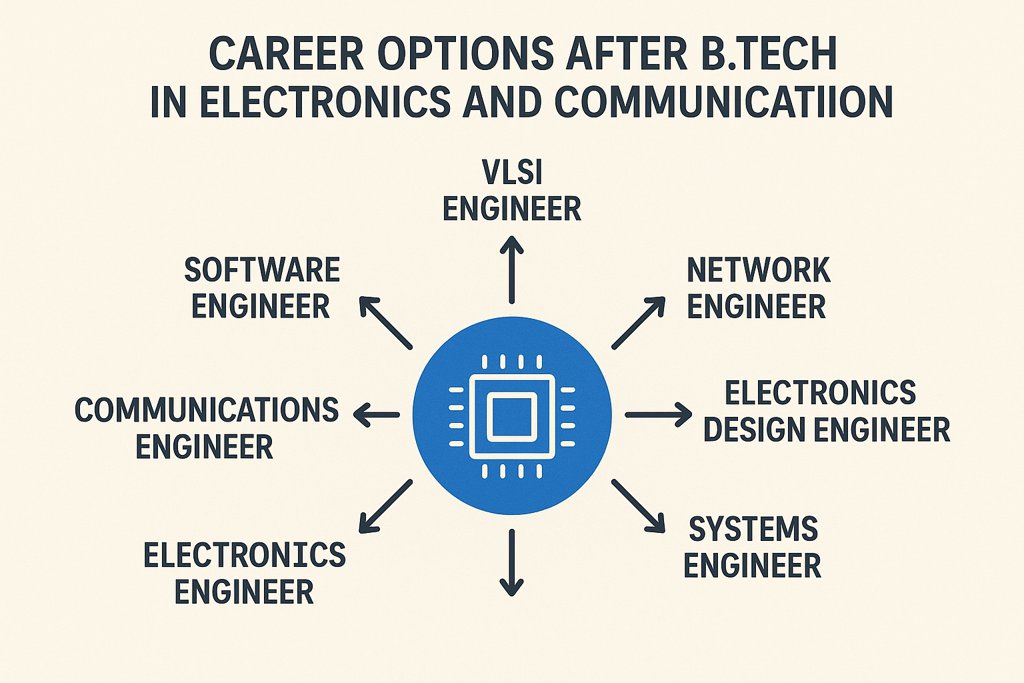
Done with your B.Tech in Electronics and Communication? Awesome. But like, what next? If you’re typing career options after B.Tech in Electronics and Communication Engineering into Google—relax, you’ve got a lot more choices than you think. From core electronics jobs to VLSI design, embedded systems, IoT, telecom, defence sector, research, M.Tech/MS abroad, or even pivoting to software, AI, or MBA, ECE grads are surprisingly versatile. Let’s explore your best moves.
🔧 Core Electronics and Hardware Roles
1. Embedded Systems Engineer
- Design microcontroller-based systems
- Tools: C/C++, ARM, AVR, STM32, RTOS
- Industry: Consumer electronics, automotive, medical devices
2. VLSI Design Engineer / RTL Engineer
- IC design, ASIC/FPGA development
- Tools: Verilog, VHDL, Synopsys, Cadence
- Companies: Intel, Qualcomm, Nvidia, TSMC
3. Electronics Design & Testing Engineer
- PCB design, testing automation
- Tools: Altium, OrCAD, LabVIEW, MATLAB
4. Control Systems / Instrumentation Engineer
- Work in industrial automation, robotics, oil & gas
- Domains: PID controllers, SCADA, PLC
5. Telecom Engineer / RF Engineer
- Network infrastructure, 5G deployment
- Employers: Jio, Airtel, Nokia, Ericsson
💻 Software, IT & Cross-Domain Careers
6. Software Developer / Systems Engineer
- ECE grads with good coding can easily switch
- Learn: Java, Python, DSA, Git
- Join IT services or product companies
7. AI/ML/Data Science
- Combine signal processing + ML
- Skills: Python, TensorFlow, OpenCV, NumPy
8. Cybersecurity / Network Security
- Roles in firewalls, intrusion detection, encryption
- Certs: CEH, CISSP, CompTIA
9. IoT Engineer / Robotics
- Design smart systems, sensor tech, automation
- Learn: Raspberry Pi, Arduino, MQTT, Python
🎓 Higher Studies After B.Tech ECE
10. M.Tech in ECE Specializations (via GATE)
- VLSI, Digital Comms, Embedded, Signal Processing
11. MS Abroad in Electronics, Robotics, Comms
- GRE + IELTS/TOEFL needed
- Countries: USA, Germany, Canada
12. MBA After ECE
- Switch to product, marketing, analytics, strategy
- Exams: CAT, XAT, GMAT
🏛️ Government Jobs & Public Sector Units (PSUs)
13. GATE + PSUs
- BHEL, ISRO, DRDO, BEL, BSNL, ECIL
- Salary: ₹8–15 LPA + perks
14. SSC JE, Railways, IES, UPSC
- Indian Engineering Services for ECE stream
- Central/State govt tech positions
🚀 Startup, Freelancing & Innovation Paths
15. Start Your Own Tech Product / IoT Startup
- Home automation, wearable tech, ed-tech kits
16. Freelance Electronics & PCB Designer
- Work with international clients on Upwork, Fiverr
17. Patent Analyst / Tech Blogger / Content Creator
- Analyze innovations, create engineering explainers
🛠️ Key Tools & Skills That Boost Your Career
- Verilog/VHDL, System Verilog
- MATLAB/Simulink
- PCB Design: Altium, Eagle
- ARM Cortex, RTOS, FreeRTOS
- Protocols: UART, SPI, I2C, CAN
- Soft Skills: Communication, Project Planning
📊 Career Options After B.Tech ECE: Summary Table
| Path | Salary Range (INR) | Sector |
|---|---|---|
| Embedded / VLSI | ₹5–18 LPA | Hardware, Chips, IoT |
| Software / AI | ₹6–25 LPA | Tech, Product Dev |
| Telecom / RF | ₹4–12 LPA | 5G, Telecom Infra |
| Govt / PSUs | ₹7–15 LPA | ISRO, DRDO, BHEL |
| MBA / Analytics | ₹8–25 LPA | PM, Ops, Marketing |
| Freelance / Startup | Varies | Innovation, Consulting |
🧠 Final Thoughts
ECE isn’t “just electronics”—it’s the foundation of almost everything modern tech runs on. With the right upskilling, an ECE grad can go anywhere—from chips to code, from hardware to AI. Keep learning, specialize smartly, and your circuits will connect with success.

